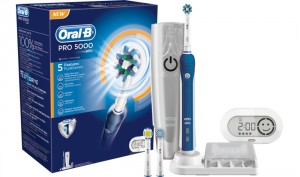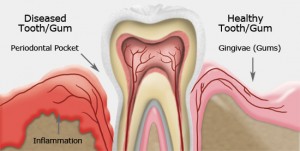Brushing our teeth at least two minutes, twice a day is one of the most effective methods for maintaining good oral health in between visits to the dentist. Proper brushing technique is equally important to ensure effectiveness and to prevent any damage to the enamel and gums.
Brushing too hard can lead to:
- Sensitivity
- Gum recession
- Worn Enamel
- Bleeding

- Red, swollen gums
How to prevent brushing too hard?
If you use a manual toothbrush, we highly suggest you use a soft-bristled toothbrush. Even better, we offer two fantastic toothbrushes at Advanced Dental Care: Sonicare and Oral-B. Our RDH Lisa Thurm prefers the Oral B Professional 5000. The round toothbrush head allows for easy access to all surfaces of the tooth and the rotating bristles work effectively to remove plaque and tartar.
(more…)


 When bacteria builds up on teeth and migrates below the gum line, the bacteria can irritate the gums causing early stage periodontal disease. When left untreated by a dental professional, the disease can quickly and easily progress to more advanced stages creating pockets. Pockets above 3mm in depth are cause for concern. Like all dental disorders, the sooner the condition can be treated, the better case for successful recovery.
When bacteria builds up on teeth and migrates below the gum line, the bacteria can irritate the gums causing early stage periodontal disease. When left untreated by a dental professional, the disease can quickly and easily progress to more advanced stages creating pockets. Pockets above 3mm in depth are cause for concern. Like all dental disorders, the sooner the condition can be treated, the better case for successful recovery.